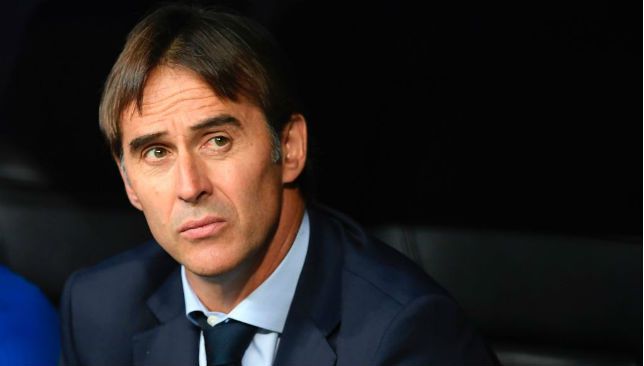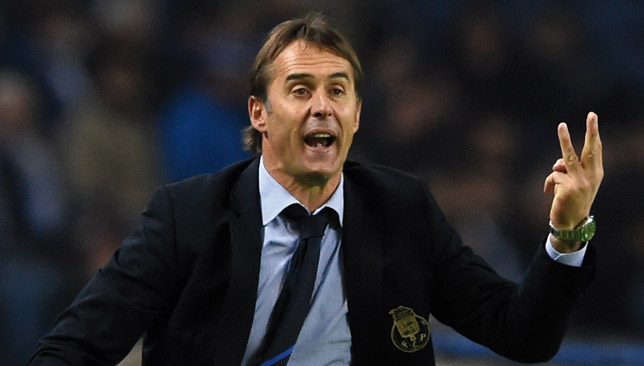
Real Madrid have announced the appointment of Spain’s Julen Lopetegui as their coach from next season.
“Julen Lopetegui will be the coach of the first team during the next three seasons,” the Champions League winners said in a statement, adding that the 51-year-old “will join the club after Spain’s participation in the World Cup“.
Lopetegui will replace Zinedine Zidane as coach at the Santiago Bernabeu, after the Frenchman quit on May 31 in the wake of their Champions League final win over Liverpool in Kiev.
The news comes as a jolt for Spain, just three days before their opening World Cup game against Portugal in Sochi.
The Spanish Football Federation (RFEF) confirmed that Madrid will pay compensation to get Lopetegui out of the two years he has remaining on his contract with the national team.
BACKGROUND
A respectable goalkeeping career which featured appearances for the likes of Real Madrid, Barcelona and Spain preceded Julen Lopetegui’s foray into management.
His first coaching job was as one of Juan Santisteban’s assistants for the Spain Under-17s before a brief and unsuccessful stint managing Rayo Vallecano.
Following a period of five years away from the dugout, he returned to coaching with Real Madrid Castilla for one season.
From 2010 to 2014, he climbed through the ranks, coaching the Spanish U19, U20 and U21 sides while winning the U19 and U21 European Championships.
Despite a largely disappointing two-year spell with FC Porto who relieved him off his duties during his second season with the club, he was appointed as Spain head coach Vincente de Bosque’s successor in 2016.
Lopetegui has since impressed in the role, storming through the World Cup 2018 qualifications and leading Spain into the tournament in Russia as one of the favourites.

Julen Lopetegui.
HONOURS
Spain U19
European Under-19 Championship 2012
Spain U21
European Under-21 Championship 2013
PHILOSOPHY
What makes some of the best coaches in the world so successful is their attention to detail. They’ve spent countless hours on the training pitch and several sleepless nights engineering a specific blueprint. It’s no wonder they can be uncompromising in their demands of players to meet the requirements of their meticulously manufactured systems so that they can be executed with absolute precision.
That’s not the kind of process Lopetegui abides by. His belief is that players shouldn’t be slaves to a particular system lest they compromise their own ingenuity, the very thing that can set them apart, make them unpredictable and help conjure a moment of brilliance.
Instead, Lopetegui provides his players with a clear structure but one within which they have the freedom to express themselves. The system, formation and indeed tempo are ultimately determined by the players’ capabilities and reaction to adopting a designated style of play which is most important. The Spaniard values good decision-making in key moments.
Lopetegui describes football as a continuous loop involving four phases: attack, the transition from attack to defence, defence and the transition from defence to attack.
Dominating possession is helpful as it facilitates the control of these four phases but Lopetegui recognises that there are a variety of ways to win a football match.
A counter-attacking aspect can be just as effective when executed at the opportune moment. Without the ball, he speaks of two key important moments: aggressively pressing the ball immediately after losing possession and if unsuccessful, the ability to restore order and find a steady defensive balance.
He prioritises a defined personality and clear concepts of the game which will then enable his players to work out the best solutions for themselves in the heat of battle.
Spain's record under Julen Lopetegui:
— Squawka Football (@Squawka) June 12, 2018
20 games
14 wins
6 draws
0 defeats
61 goals
13 conceded
11 clean sheets
They have scored at least once in *every* game. 😳 pic.twitter.com/w4LEuLCI9x
WORLD CUP TACTICS
Staying true to his philosophy, Lopetegui has proven to be tactically flexible. Spain went unbeaten in their qualification campaign, winning nine of their 10 fixtures, scoring 36 goals and shifting between a three-man and four-man defence along the way. Against tougher opposition though, Spain seemed to favour a 4-3-3 formation.
There are different variations to that system as well. Against Italy in qualifying, Sergio Busquets anchored the midfield with Andres Iniesta and either Koke or Thiago Alcantara operating ahead of him. Meanwhile, David Silva and Isco tucked in from out wide and allowed the full-backs to push forward.
Most recently though, Lopetegui has utilised a 4-2-3-1 formation with Thiago sitting alongside Busquets in midfield and Iniesta operating wide on the left with Isco as the number 10 and Silva on the right. Those three attacking midfielders in behind the striker are interchangeable and their starting positions have little bearing on how and where they affect the game.
Regardless of the system, Lopetegui’s use of the full-backs is crucial. Dani Carvajal – who will be replaced by Alvaro Odriozola for the first couple of World Cup games as he recovers from injury – and Jordi Alba push high up the field in possession and provide the team’s genuine width.
That allows the likes of Silva and Iniesta to tuck in and receive the ball in between the lines. Their supreme technical ability, close control and acceleration into pockets of space create problems in the opposition’s final third.
Without possession, Lopetegui enforces an initial high-press, compelling the opposition to attempt risky passes. The pace and width offered by the likes of Marco Asensio and Lucas Vazquez is often used off the bench.